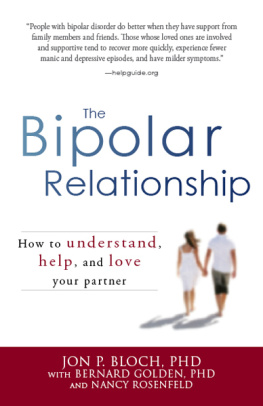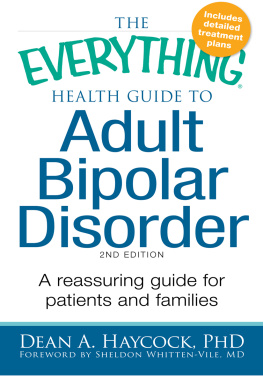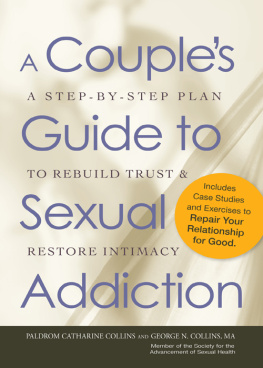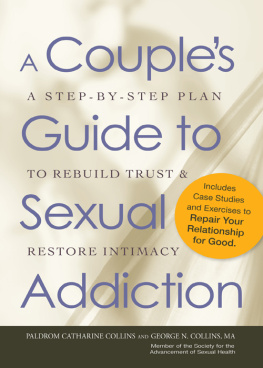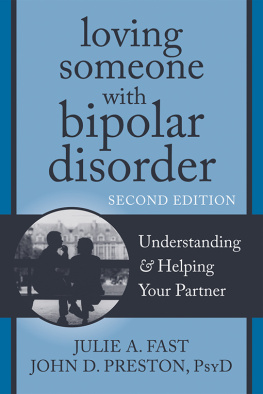
The
Bipolar
Relationship
How to understand,
help, and love
your partner
JON P. BLOCH, PHD,
BERNARD GOLDEN, PHD,
AND NANCY ROSENFELD

Copyright 2009 by Jon P. Bloch
All rights reserved.
This book, or parts thereof, may not be reproduced in any
form without permission from the publisher; exceptions are
made for brief excerpts used in published reviews.
Published by
Adams Media, a division of F+W Media, Inc.
57 Littlefield Street, Avon, MA 02322. U.S.A.
www.adamsmedia.com
ISBN 10: 1-59869-967-9
ISBN 13: 978-1-59869-967-8 (paperback)
ISBN 13: 978-1-44050-445-7 (EPUB)
Printed in the United States of America.
J I H G F E D C B A
Library of Congress Cataloging-in-Publication Data
is available from the publisher.
This publication is designed to provide accurate and authoritative information with regard to the subject matter covered. It is sold with the understanding that the publisher is not engaged in rendering legal, accounting, or other professional advice. If legal advice or other expert assistance is required, the services of a competent professional person should be sought.
From a Declaration of Principles jointly adopted by a Committee of the American Bar Association and a Committee of Publishers and Associations
Many of the designations used by manufacturers and sellers to distinguish their product are claimed as trademarks. Where those designations appear in this book and Adams Media was aware of a trademark claim, the designations have been printed with initial capital letters.
This book is available at quantity discounts for bulk purchases.
For information, please call 1-800-289-0963.
To the forces of Love and Patience
Acknowledgments
Thanks to Chelsea King of Adams Media; my agent, June Clark, of FinePrint Literary Management; and Peter Rubie, thereof.
Introduction
Bipolar disorder doesn't just affect the person who has it. As the person who loves and cares for your bipolar partner, it also affects you. This book has been written with you in mind, to offer you knowledge and skills to assist you in your long-term relationship and to provide you with increased self-understanding and self-compassion. While there is no magic wand to make the entire problem go away, there are very specific actions you can take to make life easier for yourself and for your loved ones. For this reason we have come together to help you to more effectively manage the complexities of this task.
Emotions are contagious, especially in our most significant loving relationships. Therefore, even though you're not the one who has been diagnosed with bipolar disorder, you may find yourself experiencing a whirl of shifting emotional states that leave you full of self-doubt and tension. While you may feel energized and experience great pleasure witnessing your partner's moments of unbridled energy and optimism, you may also be made understandably uneasy by the depression, anxiety, or puzzling behavior that may appear at other moments. It is not easy to live with someone whose emotions seem unpredictable, varying at moments from intense excitement accompanied with unrealistic optimism to severe immobilizing depression.
A major task in any loving relationship involves engaging in compromise for the better of the relationship while at the same time maintaining a sense of one's own identity. This may seem especially difficult when loving someone with bipolar disorder. Loving and caring for a partner with this illness can be extremely rewarding, but it may also push you to your limits of compassion and self-compassion.
A relationship with someone who has bipolar disorder forces you all to recognize what is normal or healthy and constructive or destructive. If it is in your nature to embrace optimism, you may have difficulty discerning when your partner is unrealistically optimistic. If you are uncomfortable with depressive thoughts you may even feel uneasy when your partner experiences depression. You'll learn how to deal with some of these challenges we address them throughout the book.
It is especially important to remember that you are two adults in a relationship, and that not every difficulty you face as a couple is the fault of bipolar disorder. All relationships have problems, and the acceptance of bipolar disorder is an important step toward the realization that we all are human beings living within the parameters of the awareness and skills we currently possess. This greater sense of maturity also involves the knowledge that we can strive to do better and the recognition and acceptance that every relationship requires commitment, compassion, and work.
First and foremost, as the partner of someone who lives with bipolar disorder it is essential to take good care of you by paying close attention to your own needs and desires. Self-compassion leads to a healthy partnership.
Your sustained mental and physical well-being will enable you to feel more compassionate and more supportive of your loved one. Should you at any time feel worn down by the strain of your relationship, you may want to seek professional guidance. The Bipolar Relationship provides ways of achieving a more fulfilling connection between partners by offering helpful suggestions to you, the caregiver, while you also protect yourself.
PART I
UNDERSTANDING BIPOLAR DISORDER
Fostering a rewarding relationship with your partner begins with understanding the nature of bipolar disorder. In this section, you'll learn what bipolar is, the variety of symptoms that may be associated with it, the forms of bipolar disorder, and current views on what may cause this illness. Additionally, you'll learn some common risks and situations to avoid that may exacerbate or precipitate episodes of the illness.
We share this knowledge to help you foster realistic expectations regarding your partner and your relationship. Living with bipolar illness is a major challenge and learning facts about this disorder is an essential first step in meeting this challenge.
1
What You Need to Know
You've picked up this book because the person you love has bipolar illness. By doing so, you demonstrate deep compassion and commitment in your desire to provide the best possible support for your partner, yourself, and the relationship. But, before we go further, let's clear up a few misconceptions:
There is no shame in loving a person with bipolar disorder.
It is not your fault your partner has bipolar disorder.
It is not your partner's fault he has bipolar disorder.
You cannot fix your bipolar partner.
But what you can do and you've taken the first step here is arm yourself with information that will help you better understand what your partner is going through and weather the rocky times in your relationship. Every couple has their issues, but you are not a typical couple. You face unique challenges and they will be explored. It is important to remember that many people who live with bipolar disorder do not always exhibit symptoms of the illness. At times you will feel just like any other couple with all the usual ups and downs.
What Is Bipolar Disorder?
Bipolar disorder is an illness that is biological in origin and affects moods, judgment, and behavior. Formerly called manic depression, bipolar disorder involves mood swings that are out of proportion to what is going on in one's life and that vary from intense mania to depression. While everyone experiences ups and downs related to happiness, sadness, and anger, bipolar disorder is marked by the intensity of these reactions. And, while these episodes may follow a life stress, they may persist long after the stressful experiences has been resolved. In general, mania may be characterized by heightened energy, optimism, and activity; depression may include feelings of hopelessness and helplessness, constriction in emotions, and fatigue. (We offer a more complete detailed description of these symptoms in the next section.) Although this illness is related to chemical changes in the brain and is viewed as being influenced by genetic factors, some people still falsely assume the cause is a moral or character flaw.

